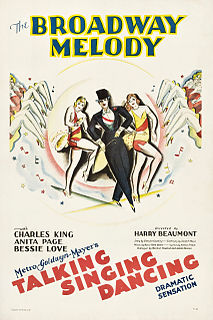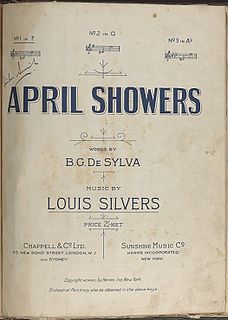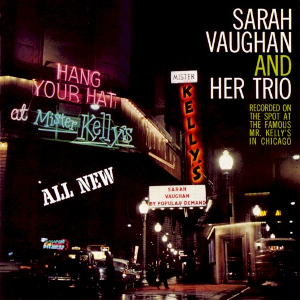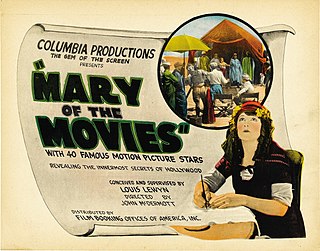
The Broadway Melody, also known as The Broadway Melody of 1929, is a 1929 American pre-Code musical film and the first sound film to win an Academy Award for Best Picture. It was one of the first musicals to feature a Technicolor sequence, which sparked the trend of color being used in a flurry of musicals that would hit the screens in 1929–1930. Today, the Technicolor sequence survives only in black and white. The film was the first musical released by Metro-Goldwyn-Mayer and was Hollywood's first all-talking musical.

This is a list of notable events in music that took place in the year 1929.

George Gard "Buddy" DeSylva was an American songwriter, film producer and record executive. He wrote or co-wrote many popular songs and, along with Johnny Mercer and Glenn Wallichs, he co-founded Capitol Records.
Ray Henderson was an American songwriter.

Lew Brown was a lyricist for popular songs in the United States. During World War I and the Roaring Twenties, he wrote lyrics for several of the top Tin Pan Alley composers, especially Albert Von Tilzer. Brown was one third of a successful songwriting and music publishing team with Buddy DeSylva and Ray Henderson from 1925 until 1931. Brown also wrote or co-wrote many Broadway shows and Hollywood films. Among his most-popular songs are "Button Up Your Overcoat", "Don't Sit Under the Apple Tree", "Life Is Just a Bowl of Cherries", "That Old Feeling", and "The Birth of the Blues".

The Singing Fool is a 1928 American musical drama part-talkie motion picture directed by Lloyd Bacon which was released by Warner Bros. The film stars Al Jolson and is a follow-up to his previous film, The Jazz Singer. It is credited with helping to cement the popularity of American films of both sound and the musical genre.

Good News is a musical with a book by Laurence Schwab and B.G. DeSylva, lyrics by DeSylva and Lew Brown, and music by Ray Henderson. The story is set in the Roaring Twenties at Tait College, where football star Tom Marlowe falls in love with studious Connie Lane, who is tutoring him so he can pass astronomy and be eligible to play in the big game.
"It All Depends on You" is a 1926 popular song with music by Ray Henderson, lyrics by Buddy G. DeSylva and Lew Brown. The song, written for the musical Big Boy, was published in 1926. It was featured in the hit 1928 Warner Bros. film The Singing Fool, starring Al Jolson, Betty Bronson and Josephine Dunn, and directed by Lloyd Bacon.
"You're the Cream in My Coffee" is a popular song published in 1928. Popular recordings were by Annette Hanshaw, Ben Selvin, Ted Weems and Ruth Etting.

At Mister Kelly's is a 1957 live album by American jazz singer Sarah Vaughan, recorded at Mister Kelly's jazz club in Chicago.

Follow Thru is a 1930 American pre-Code musical romantic comedy film photographed entirely in Technicolor. It was the second all-color all-talking feature to be produced by Paramount Pictures. The film was based on the hit 1929 Broadway musical of the same name by Lew Brown, B. G. DeSylva, Ray Henderson and Laurence Schwab. The musical ran a total of 401 performances from January 9, 1929 to December 21, 1929. Jack Haley and Zelma O'Neal, who starred in the Broadway production, reprised their roles in the film version.

Good News is a 1947 Metro-Goldwyn-Mayer musical film based on the 1927 stage production of the same name. It starred June Allyson, Peter Lawford, Mel Tormé, and Joan McCracken. The screenplay by Betty Comden and Adolph Green was directed by Charles Walters in Technicolor.

Lord Byron of Broadway (1930), also known as What Price Melody?, is an American Pre-Code musical drama film, directed by Harry Beaumont and William Nigh. It was based on a best selling book by Nell Martin, which "was widely praised by critics as an extremely true and amusing romance of stage life." It was filmed in black and white with two-color Technicolor sequences.

The Best Things in Life Are Free is a 1956 American musical film directed by Michael Curtiz. The film stars Gordon MacRae, Dan Dailey and Ernest Borgnine as the real-life songwriting team of Buddy DeSylva, Lew Brown and Ray Henderson of the late 1920s and early 1930s; and Sheree North as Kitty Kane, a singer.

Dynamite Smith is a 1924 American silent drama film directed by Ralph Ince and written by C. Gardner Sullivan. The film stars Charles Ray, Bessie Love, and Wallace Beery, and was distributed through Pathé Exchange.

The Eternal Three is a 1923 American silent drama film produced and distributed by Goldwyn Pictures. It was directed by both Marshall Neilan and Frank Urson. Hobart Bosworth, Claire Windsor, and Bessie Love star.

The Woman on the Jury is a lost 1924 American silent drama film produced and released by Associated First National and directed by Harry Hoyt. It is based on a Broadway stage play, The Woman on the Jury, and stars Sylvia Breamer and Bessie Love. The story was refilmed in 1929 as an early talkie under the title The Love Racket starring Dorothy Mackaill.

See America Thirst is a 1930 American comedy film produced and distributed by Universal Pictures and directed by William James Craft. Silent comics Harry Langdon and Slim Summerville star along with silent actress Bessie Love. Though released late in 1930, it nevertheless had a silent version.

The Enchanted Barn is a 1919 American silent drama film produced by Vitagraph Studios. It was directed by David Smith and starred Bessie Love and J. Frank Glendon. The script was written by Kathryn Reed, based on the novel by Grace Livingston Hill Lutz. Bessie Love had been familiar with the source novel, and was instrumental in optioning it for this film.

Mary of the Movies is a 1923 American silent semi-autobiographical comedy film based on the career of Marion Mack. It was written by Mack and her husband Louis Lewyn, and stars Mack and Creighton Hale. Hale and director John McDermott play fictionalized versions of themselves in the film, which was also directed by McDermott.
















